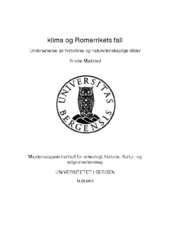Klima og Romerrikets fall, undersøkelse av historiske og naturvitenskaplige kilder
Master thesis
Permanent lenke
https://hdl.handle.net/1956/18066Utgivelsesdato
2018-06-16Metadata
Vis full innførselSammendrag
This master’s thesis addresses how climate and climate change may have affected the fall of the Western Roman Empire. In my thesis I have combined historical sources and data from natural science to get a better and more comprehensive overview of the role climate has played. I have used historical sources to analyse specific climatic events and shocks, while natural science has been used to analyse how climate developed globally and in different regions of the Roman Empire. In this thesis, I have studied how various underlying factors such as agricultural changes, disease outbreaks, population decline, infrastructure, extreme weather and erosion may have helped weaken the Roman Empire. In addition, I evaluate external factors such as pandemic outbreaks and climate changes that might also have functioned as a triggering cause of the fall of Western Rome. This thesis consists of four main parts. The fist concerns various kinds of climate data that provide different indications and information about how the climate changed and developed. I have used climate data from dendrochronology, pollen analyses from lakes, the movements of glaciers, solar activity, and volcanic eruptions as my main source of data. In the second part I address historical sources such as flooding and other climatic events and analyse how these different events have influenced the infrastructure, population, and livestock. I also study how climate affected agriculture and how people in various regions may have changed agricultural production due to diverse types of climate change. The third part examines famines and diseases in the Roman Empire, in particular how climate can lead to more occurrences of famine and if historical sources can function as a valid indicator of this problem. In the last part of this master’s thesis I research the last 100 years of the Western Roman Empire from the battle of Adrianople in year 378 to the last Roman emperor Romulus Augustus. I examine the impact climate may have had on the Huns movements towards the West. Lastly, I investigate historical incidents of climate events for this time period, to evaluate if this data can give any indication of a possible negative climate effect on the Roman Empire. After close evaluation of different climate data from both natural science and historical sources used in this thesis, I conclude that the climate of the Roman Empire was severely worse during the last 300 years of the empire than the first 200 years after Christ. In addition, actions of the Huns may very well be connected to climate changes. However, there is no clear indication that climate is explanatory factor of why the West Roman Empire fell in this period.
